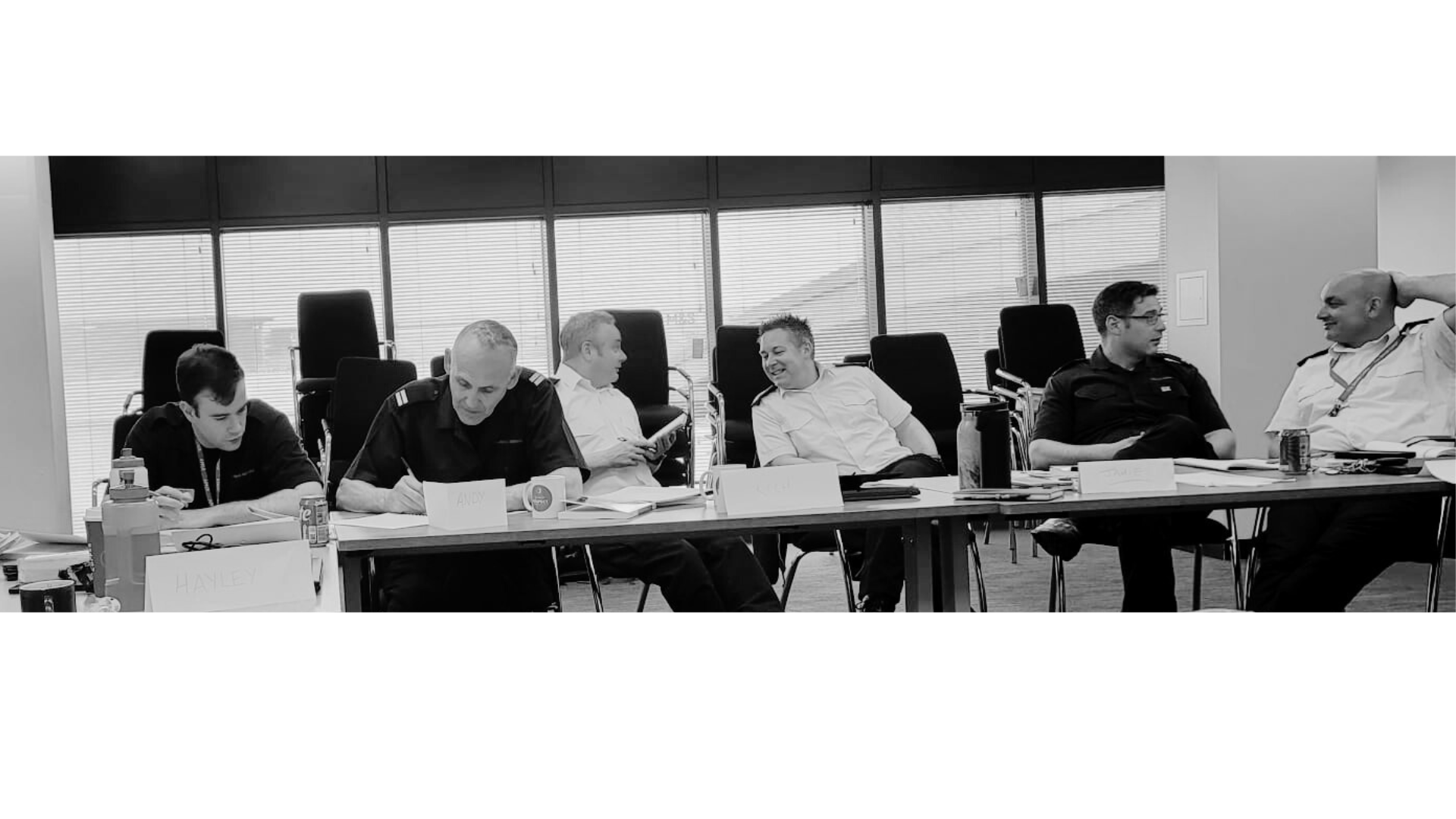Good Training - a matter of Life and Death! Embracing Professional Development
Marianne Mills • 20 November 2024
We don't talk about this....

Lessons from an episode of our podcast!
A recent episode of 'A Better Way Of Life' podcast featured an in-depth and heartfelt discussion about death, dying, and grief, and it brought forward several crucial insights regarding the necessity for professional training across various fields.
1. The Human Touch in Professional Training
One key takeaway is the profound impact that professional training can have when it incorporates a human touch. Whether dealing with end-of-life care or handling difficult workplace situations, training that focuses on empathy, emotional intelligence, and human connections can significantly enhance professionals' effectiveness.
This human-centred approach helps build a more compassionate and supportive environment, whether it’s in healthcare, corporate settings, or any other professional domain.
2. Bridging Knowledge Gaps
Despite having extensive technical expertise, many professionals lack training in the softer skills required for sensitive situations.
The episode highlighted the importance of bridging these knowledge gaps through targeted training. Guidance on how to handle emotionally charged scenarios delicately and with sensitivity is essential for professionals, including doctors, nurses, police officers, and business leaders.
This ensures better outcomes for those they serve.
3. Tailoring Training to Individual Needs
Another critical lesson is the need for personalised training approaches. Just as every human relationship and experience with grief is unique, so should be the training methods.
For instance, some individuals may require more support in developing communication skills, while others might need training in managing their emotions and stress. Tailoring education programs to individuals' specific needs ensures they are well-prepared and resilient in their roles.
4. Encouraging Open Dialogues
The podcast also underscored the power of open communication and dialogue in professional growth. Encouraging professionals to discuss their experiences, challenges, and learning fosters a culture of transparency and continuous improvement.
Such conversations can lead to better understanding and more effective strategies in handling complex issues, ultimately benefiting the entire organisation.
5. Continuous Learning and Adaptation
Finally, the episode illustrated the importance of continuous learning and adaptation in professional training. The world is constantly evolving, and so are the challenges faced by professionals across industries. Continuous professional development programs that adapt to new knowledge, technologies, and societal changes ensure that professionals remain competent and confident in their abilities.
Professional training plays a critical role in preparing individuals to handle the multifaceted challenges of their jobs. By focusing on empathy, personalised approaches, open communication, and continuous learning, we can nurture more effective, compassionate, and resilient professionals ready to make a positive impact in their fields
#Training #Compassion #Empathy #NeuroDiversity

The way we work is changing faster than ever, and yet many organisations are struggling to keep pace. Any decent conversation about training and professional development reveals hard truths about how some businesses approach employee engagement, upskilling, and development. Here's a deeper look at where things are going wrong and how companies can improve. 1. Employee Engagement is Stuck in Neutral Recent UK data paints a concerning picture. Gallup’s 2023 State of the Global Workplace report found that only 9% of UK employees are engaged in their work—a figure significantly below the global average of 23%. Low engagement isn't just a morale issue; it affects performance, retention, and even profitability. Lesson for Employers: Engagement begins with understanding employees' needs. Invest in meaningful workplace relationships, recognise achievements, and create opportunities for employees to connect with the larger mission of the organisation. 2. The Up-skilling Imperative The UK's skills gap is growing. The 2022 Employer Skills Survey found that 15% of employers reported skills gaps among existing staff. Sectors like tech and security are particularly vulnerable, where outdated qualifications and limited CPD (Continuous Professional Development) opportunities stifle progress. The issue isn’t just funding or training access; it’s quality. Stories abound of trainers and managers in roles without the requisite skills or qualifications, leading to "tick-box" training that fails to create real impact. Lesson for Employers: Upskilling must be a strategic priority. Businesses need to focus on offering high-quality, accredited training that is relevant and impactful. The long-term benefits far outweigh the costs. 3. CPD and the "Bare Minimum" Culture Too often, CPD becomes a compliance exercise. Employees complete the minimum required courses without any real engagement or application. This issue is exacerbated by a culture of last-minute training and a focus on cost-saving over quality. Lesson for Employers: Encourage a culture of learning. Recognise and reward employees who proactively engage in their development. Offer bespoke CPD programmes that align with career progression goals and broader business objectives. 4. Leadership and Management Training Gaps It’s shocking how many training managers lack formal qualifications in education or training. In industries like security, where regulations demand specific standards, shortcuts in training lead to subpar results. Managers often get promoted based on tenure or expertise in a role rather than their ability to lead or train others (It is NOT the same thing!) Lesson for Employers: Leadership matters. Investing in proper leadership training ensures managers can inspire, coach, and develop their teams effectively. 5. The Commercial Pressure vs. Quality Debate The pandemic accelerated online learning adoption, but it also exposed significant quality gaps. In some industries, like security, essential hands-on training is being replaced by online courses, leading to a loss of critical skills. Meanwhile, cost-cutting measures often undermine the quality of instruction. Lesson for Employers: Resist the race to the bottom. Opt for high-quality training providers who meet rigorous standards, even if they cost more. Quality training pays dividends in employee performance and organisational reputation. The Path Forward Businesses need to move beyond short-term thinking when it comes to training and engagement. Here’s how they can start: Invest in People: Treat training as a strategic investment rather than an expense. Prioritise Engagement: Build a workplace culture that values transparency, recognition, and personal growth. Embrace Lifelong Learning: Foster a mindset of continuous improvement among all employees. Demand Accountability: Choose training providers who adhere to industry standards and ensure your programmes deliver measurable results. The message is clear: businesses that fail to prioritise employee engagement and upskilling risk falling behind. The time to act is now. By investing in their people, organisations can unlock a wealth of potential, ensuring they remain competitive in an ever-changing world. What are your thoughts? Are we doing enough to support employees in the workplace? #Training #Culture #Leadership #Inclusion

Understanding Training and Education Qualifications Navigating the various training and education qualifications can be complex, so here’s a breakdown of some key qualifications to help clarify their differences and purposes: The Award in Delivering Training Level 3 This qualification is designed for those who are new to training or have some experience but want to formalise their skills. It focuses on practical skills in planning, delivering, and evaluating training sessions. Ideal for anyone looking to become a trainer in a workplace or community setting. Key Aspects: - Basic introduction to training delivery - Focuses on practical teaching skills - Suitable for beginners Award in Education and Training (AET) Level 3 Formerly known as PTLLS (Preparing to Teach in the Lifelong Learning Sector), this qualification is the starting point for anyone wanting to teach in the further education and skills sector. It covers roles, responsibilities, and relationships in education, as well as planning and delivering inclusive teaching sessions. Key Aspects: - Introductory teaching qualification - Covers theoretical and practical aspects - Suitable for those entering teaching/training roles Certificate in Assessing Vocational Achievement (CAVA) This qualification is aimed at individuals who assess occupational competence in the workplace or vocational skills in environments like workshops or training centres. It includes knowledge and practical aspects of assessment. Key Aspects: - Focuses on assessment skills - Includes workplace and vocational assessment - Suitable for assessors of vocational qualifications Certificate in Education and Training (CET) Level 4 Building on the AET Level 3, the CET Level 4 qualification is for those who are already in a teaching role and want to develop their skills further. It covers a deeper understanding of planning, delivering, and assessing teaching and learning. Key Aspects: - Advanced teaching skills and theories - Focuses on planning and assessment - Suitable for in-service teachers and trainers Diploma in Education and Training (DET) Level 5 Previously known as DTLLS (Diploma in Teaching in the Lifelong Learning Sector), this is a higher-level qualification for those who want to fully qualify as teachers in the further education and skills sector. It involves a comprehensive study of teaching theories, practices, and professional development. Key Aspects: - Comprehensive teacher training qualification - In-depth study of educational theories and practices - Suitable for those aiming for full teaching roles in further education Summary The Award in Delivering Training Level 3: Basic introduction for new trainers. AET Level 3: Entry-level teaching qualification for aspiring teachers. CAVA: Focus on assessing vocational competence. CET Level 4: Intermediate qualification for current teachers to enhance their skills. DET Level 5: Advanced qualification for those aiming for a full teaching career in further education. Choosing the right qualification depends on your current role, experience, and career aspirations in the education and training sector.

Emotional Freedom Therapy (Meridian Tapping) Description of EFT (or ‘Meridian Tapping’) Developed by Stanford University academic Gary Craig and building on the work of other academics in related fields such as Drs Roger Callaghan and George Goodheart, EFT forms part of what is called Energy Psychology in the English speaking world today. Cutting edge research into how the body stores and processes trauma combines with advanced neuro-linguistic programming (NLP) techniques, and ancient Chinese knowledge of the body’s energy pathways (the meridian system) to produce a gentle conversation based therapy involving tapping on certain points on the upper body, while holding a thought or memory in the mind. EFT is a powerful way of regulating the nervous system, clinically proven in studies to reduce the stress hormone cortisol by between 43% and 47% in under an hour, eliciting a feeling of calm. EFT has been proven in randomised controlled trials to be especially helpful with: Anxiety Depression Food Cravings PTSD It is worth checking out the scientific evidence for EFT - there are now over 140 studies including worldwide. Here are just a few of them:- EFT as a treatment for PTSD https://pubmed.ncbi.nlm.nih.gov/27889444/ A ‘meta analysis’ of randomised controlled trials on the use of EFT for the treatment of depression https://pubmed.ncbi.nlm.nih.gov/27843054/ EFT use for physical as well as emotional health https://www.ncbi.nlm.nih.gov/pmc/articles/PMC6381429/ EFT can be used across a whole range of other emotional and physical conditions, as it is now widely recognised that many physical ailments have their roots in emotional disturbances. While everyone is different, typically between 4 – 10 treatments are needed to achieve most clients’ goals. With the support of a Practitioner, EFT can unwind years of stress and trauma stored in the body and mind. It is also scientifically proven to be one of the world’s most effective treatments for Post Traumatic Stress Disorder (PSTD) and unusually for treatments for this condition, gains made with EFT are maintained afterwards. It’s also easy to learn and there are many resources out on the web. Integrating tapping into your day, even 5 or 10 minutes of self care, can help you deal with the stresses and strains of modern life, retaining a grander perspective, and helping you to maintain your wellbeing long after treatment with a practitioner ends. EFT combines very well with yoga and meditation and other therapies based on the body’s meridian system. Who can benefit? Anyone who does not have the time or ‘headspace’ to do written homework! Anyone who prefers to (of course gently and with compassionate support) zero in on the root cause of their emotional and physical symptoms in a targeted way to eliminate the emotional charge/s associated with a thought or memory while keeping the need for discussion to a minimum. Anyone who would like to keep some painful information private during therapy -as long as you are willing to hold the thought or memory in your mind during the session, while helpful it is not always necessary to disclose the details to the therapist. Incredibly, EFT will still work. Anyone who wants to take control of their health and well-being in a flexible manner. Once the client’s goals have been achieved with a practitioner, clients commonly continue practicing self care using EFT on themselves occasionally coming back into therapy with a practitioner to take a deep dive into a particular issue. Please get in contact with 2M Training if you are interested in EFT and if you would be interested in a short workshop. Thank you Julia Adams (EFT Level 2 Practitioner)

When you give, you get a whole lot more back! It’s been a pretty big week in the Mills household, with our youngest, Oliver, having heart surgery Tuesday. Surgeons worked their magic and now he is hopefully good to go until he is 16. Whilst we were tag teaming sitting with him (Covid restrictions) I decided to make good use of the time and do another drop-off of donations to a place that is very special to us, so special in fact that I am the first Volunteer Community Ambassador for Ronald McDonald House Bristol. If, like me 8 years ago, you had never heard of this place I will briefly tell you about it. Ronald McDonald House Bristol offers free home from home accommodation for families who have a child who is seriously ill in Bristol Children’s Hospital. At a time when you have so much else to think about, having your accommodation sorted and everything else you would need at home, is a massive lifeline. We used the house 8 years ago when Oliver was only 5 months old and very poorly. My husband came in to the hospital with 2 Easter eggs that had been left by their door. I was completely bowled over by the sheer kindness of others…others that we had never met! And so from that moment onwards I decided to support the house. This support has included Easter egg collections for the past 7 years, similarly with Christmas too, cake sales, garage sales, skydive (mum 71 year old mum-not me!), raffles, auctions, toiletry and household item collections, pamper nights and much more. As a community we have sponsored a room in the house too. When Oliver was in hospital overnight this week, the lady opposite had stayed at the house for 8 months and the lady next to me, who had a 5 day old had been staying there for 3 nights since having their little boy as they had travelled from Cornwall. It was so touching to hear what a massive help the house had been to both of them. I felt extremely proud to know that I had played a small part in that. I vowed to always support the house and now that 2M Training has been born, I will continue to support the house through this business too. So you can be sure that when you choose to train with 2M Training, you are actually helping families across the South West during a really difficult time in their life. 2M Training proudly supports RMH Bristol https://www.rmhbristol.com

The afternoon started out so beautifully..... Sun shining (finally), blue skies (aeroplanes going goodness w=knows where), 2 , excited and very clean dogs, an 8 year old donning shorts, 2 relieved parents (taking a break from home schooling) and lots of beautiful hills, fields and woods…. Lucky to be living in the Cotswolds. All was great until one dog ran off and it resulted in me ending up stuck in the mud! One option was to ditch my boots and crawl out...but that'd be extremely messy and I would lose my beloved boots. Instead I waited patiently and with some help I got out. On International Women's Day I read many articles of some amazing women who have achieved so much (truth be told, all women are amazing in their own unique way). So often we read about others and make assumptions that the face we see hasn’t trodden a difficult path. The reality is that we discover that their journey has been a long and hard one. So I have reflected that being a strong, independent woman isn’t about doing that journey alone, it is in fact about accepting that in life, in order to succeed we sometimes need some help or to gain a different perspective. Some of the greatest lessons in life I have learnt have been when I have reached out because I have felt stuck.....and this past year has been no exception! In fact I have been somewhat stuck in the mud for months and months. It was only when I decided that I was going to remain stuck if I didn’t find a way out, that I listened to my own advice and sought help to get ‘unstuck’. So this strong and independent women reached out and asked for help and well let’s just say I am now running free. At 2M Training believes that where there's a will there's a way, so if you feel stuck and need to move forwards, why not have a chat with us about where you are at and where you want to get to….it may be the best thing you ever do (in fact ask other customers and they will tell you it WAS the best thing they ever did!)